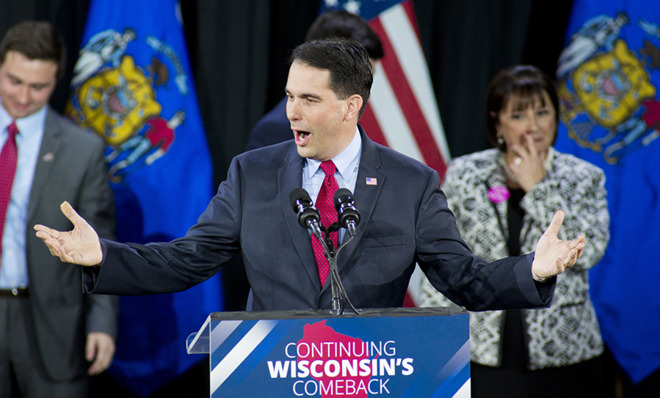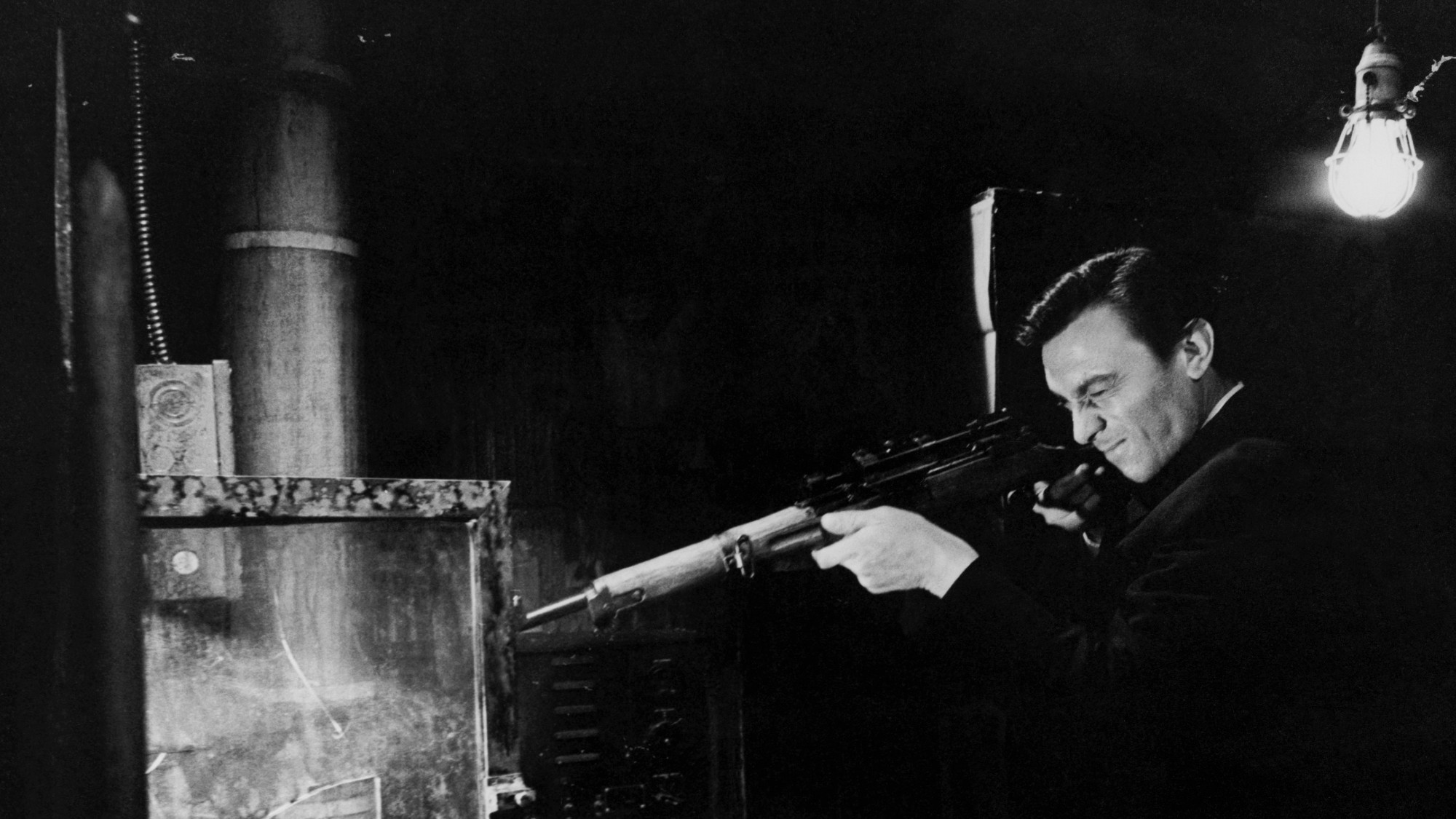
Wisconsin Gov. Scott Walker (R) pulled off a stunner of a solid victory on Tuesday. And after his very public fights with Wisconsin's public sector unions, the governor's re-election is being billed as a major blow to Big Labor.
In the long run, that is no doubt true. But unions might not have that much to worry about in the foreseeable future. That's because there just aren't many governors, including Walker himself, who are going to have the appetite or the need to push anti-union measures until the economy tanks again.
It's easy to see why Walker's win is seen as terrible for Big Labor. Unions had put a bull's eye on Walker ever since he signed the union-deflating Public Act 10 into law in 2011. Walker's law went well beyond eliminating compulsory payment of union dues as a condition of employment in union shops, as right-to-work laws (including one signed by Michigan Gov. Rick Snyder) do. Although, unlike right-to-work, it applies only to public sector unions, it: bars employers from withholding dues from employee paychecks and tells union bosses to make their own collection arrangements; requires unions to be recertified every year; mandates government employees to contribute more toward their pension and health care benefits; and restricts collective bargaining to base wages — making benefits, workplace arrangements, and staffing levels off limits. These restrictions were crucial in freeing local budgets from the chokehold of unions, saving state taxpayers $2 billion in just its first year.
The Week
Escape your echo chamber. Get the facts behind the news, plus analysis from multiple perspectives.

Sign up for The Week's Free Newsletters
From our morning news briefing to a weekly Good News Newsletter, get the best of The Week delivered directly to your inbox.
From our morning news briefing to a weekly Good News Newsletter, get the best of The Week delivered directly to your inbox.
And that's just on the fiscal end. On the political side, PA 10 broke the nexus between the Democratic Party and Big Labor. By preventing labor from garnishing dues and funneling them back to elect Democrats (who, in turn, would reward their union benefactors with sweet contracts), Walker ended a key political advantage that Democrats have been milking for a long time in the Dairy State (as others). In the first year after the law went into effect, membership in Wisconsin's public unions fell from 50 percent to 37 percent.
This is why Big Labor pulled out all the stops against Walker, including forcing him in 2012 to suffer the indignity of being the first Wisconsin governor to face a recall election. (He won with an even bigger margin than his original election.) They accused him of siring an illegitimate child. And, more recently, the Democratic assistant attorney general of the state opened a "John Doe investigation" that allowed him to raid and ransack the homes and offices of Walker's staff to look for evidence of collusion with conservative advocacy groups without establishing probable cause first. (He came up empty.)
If such harassment had succeeded, it would have sent the message to other Republican governors that they shouldn't try similar labor reforms at home. That's why Republican National Congress Chairman Reince Preibus declared on election eve that if Republicans won the Senate but lost Walker — or Snyder — it would "not be a good night" for Republicans.
Still, for now, these are largely moral victories for Republicans. National Right to Work spokesman Patrick Semmens told me that Republicans have no plans to spring any major labor reforms on other states. "There is no vast right wing conspiracy," he chuckled. And it is highly unlikely that any governor will unilaterally push right-to-work laws, let alone drastic Walker-style reforms on his or her own.
A free daily email with the biggest news stories of the day – and the best features from TheWeek.com
That Walker is still standing despite a relentless union onslaught certainly shows that the union bark is worse than its bite, as Mackinac Center for Public Policy's Labor Director Vincent Vernuccio points out. Still, victory hasn't been without costs for Walker. He was forced to spend his first term fending off union attacks, something that left him little time to actually govern. Worse, the uncertainty, as Walker himself admits, depressed growth and jobs in Wisconsin as businesses held back investments. This is why, despite his unusually strong stomach for confrontation, he has foresworn making Wisconsin a right-to-work state, even though that will leave its manufacturing sector at a huge competitive disadvantage compared to the 24 other right-to-work states in the country, especially neighboring Michigan and Indiana.
Likewise, Ohio's John Kasich, a Republican who just cruised to a second term, has pledged not to push restrictions on the collective bargaining rights of public unions or right-to-work laws after voters overturned his Wisconsin-lite legislation in 2012. As for the other non-right-to-work states with Republican governors — Illinois, Massachusetts, Maine, and New Mexico — they are simply not red enough to count on strong public support to make a switch stick.
And if right-to-work is going to be hard to pull off, targeting public unions with Walker-style reforms will be almost impossible for the simple reason that their time may have passed for now.
Indeed, when Walker assumed office, Wisconsin, like many other states, was staring at a massive $3.6 billion biannual budget deficit, thanks to the recession. Hence, he could justify bold conservative measures to put the state on a strong fiscal footing.
However, with the recession over, revenues are once again flowing in and state balance sheets are improving. Only 14 states now face a deficit. And it's a rather small combined total of $8.6 billion, according to a National Association of Budget Offices survey. "This is a drop in the bucket compared to what states faced four years ago," notes Reason Foundation Director of Government Reform Leonard Gilroy. Radically stripping unions of their collective bargaining powers in the absence of a fiscal emergency risks coming across as a nakedly political move that might not sit well with state voters. That is why Walker's Republican colleagues in other states will have to be very careful about the lessons to draw from his experience.
The country had to wait over 60 years for more dominoes to fall after an initial wave of states went right-to-work in the 1940s and 1950s. The next round might not have to wait quite so long — just till the next economic downturn.
Big Labor can take a deep breath until then and pray that the economy never tanks. But Walker's victory shows that when it does, they will be fair game.
Shikha Dalmia is a visiting fellow at the Mercatus Center at George Mason University studying the rise of populist authoritarianism. She is a Bloomberg View contributor and a columnist at the Washington Examiner, and she also writes regularly for The New York Times, USA Today, The Wall Street Journal, and numerous other publications. She considers herself to be a progressive libertarian and an agnostic with Buddhist longings and a Sufi soul.
-
 ‘Pandoro-gate’: the sweet treat scandal that rocked Italy
‘Pandoro-gate’: the sweet treat scandal that rocked ItalyIn The Spotlight Italy’s most famous influencer, Chiara Ferragni, has been cleared of fraud over Christmas cake fundraiser
-
 The 8 best spy movies of all time
The 8 best spy movies of all timethe week recommends Excellence in espionage didn’t begin — or end — with the Cold War
-
 Why scientists want to create self-fertilizing crops
Why scientists want to create self-fertilizing cropsUnder the radar Nutrients without the negatives
-
 The billionaires’ wealth tax: a catastrophe for California?
The billionaires’ wealth tax: a catastrophe for California?Talking Point Peter Thiel and Larry Page preparing to change state residency
-
 Bari Weiss’ ‘60 Minutes’ scandal is about more than one report
Bari Weiss’ ‘60 Minutes’ scandal is about more than one reportIN THE SPOTLIGHT By blocking an approved segment on a controversial prison holding US deportees in El Salvador, the editor-in-chief of CBS News has become the main story
-
 Has Zohran Mamdani shown the Democrats how to win again?
Has Zohran Mamdani shown the Democrats how to win again?Today’s Big Question New York City mayoral election touted as victory for left-wing populists but moderate centrist wins elsewhere present more complex path for Democratic Party
-
 Millions turn out for anti-Trump ‘No Kings’ rallies
Millions turn out for anti-Trump ‘No Kings’ ralliesSpeed Read An estimated 7 million people participated, 2 million more than at the first ‘No Kings’ protest in June
-
 Ghislaine Maxwell: angling for a Trump pardon
Ghislaine Maxwell: angling for a Trump pardonTalking Point Convicted sex trafficker's testimony could shed new light on president's links to Jeffrey Epstein
-
 The last words and final moments of 40 presidents
The last words and final moments of 40 presidentsThe Explainer Some are eloquent quotes worthy of the holders of the highest office in the nation, and others... aren't
-
 The JFK files: the truth at last?
The JFK files: the truth at last?In The Spotlight More than 64,000 previously classified documents relating the 1963 assassination of John F. Kennedy have been released by the Trump administration
-
 'Seriously, not literally': how should the world take Donald Trump?
'Seriously, not literally': how should the world take Donald Trump?Today's big question White House rhetoric and reality look likely to become increasingly blurred
